Behavioral Change Models: A Case Study of Harry's Obesity
VerifiedAdded on 2022/11/07
|9
|2490
|348
Essay
AI Summary
This essay critically examines the application of Motivational Interviewing and the Transtheoretical Model (TTM) in addressing unhealthy behaviors, specifically focusing on a case study of an obese patient named Harry. It begins with a brief overview of both the Motivational Interviewing technique, a client-centered counseling approach, and the TTM, a biopsychosocial model outlining stages of behavioral change. The essay then analyzes Harry's situation, placing him in the precontemplation stage of the TTM and detailing how Motivational Interviewing can be used to move him through the stages of change. The role of the nurse in each stage is discussed, emphasizing the importance of education, open-ended questioning, empathy, and support to facilitate Harry's progress towards adopting healthier habits and managing his weight. The essay highlights the integration of both models to promote patient-centered care and achieve positive health outcomes.
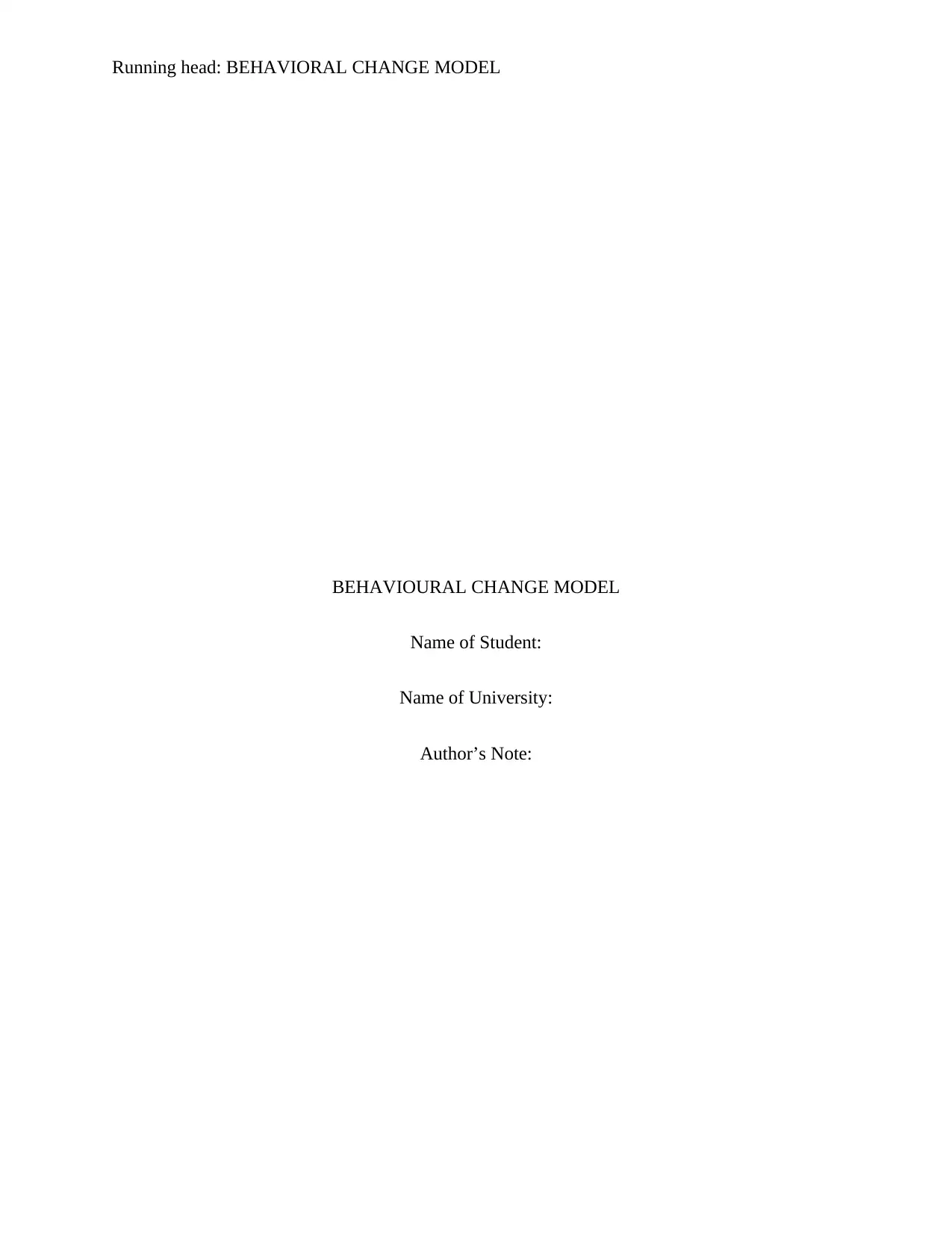
Running head: BEHAVIORAL CHANGE MODEL
BEHAVIOURAL CHANGE MODEL
Name of Student:
Name of University:
Author’s Note:
BEHAVIOURAL CHANGE MODEL
Name of Student:
Name of University:
Author’s Note:
Paraphrase This Document
Need a fresh take? Get an instant paraphrase of this document with our AI Paraphraser
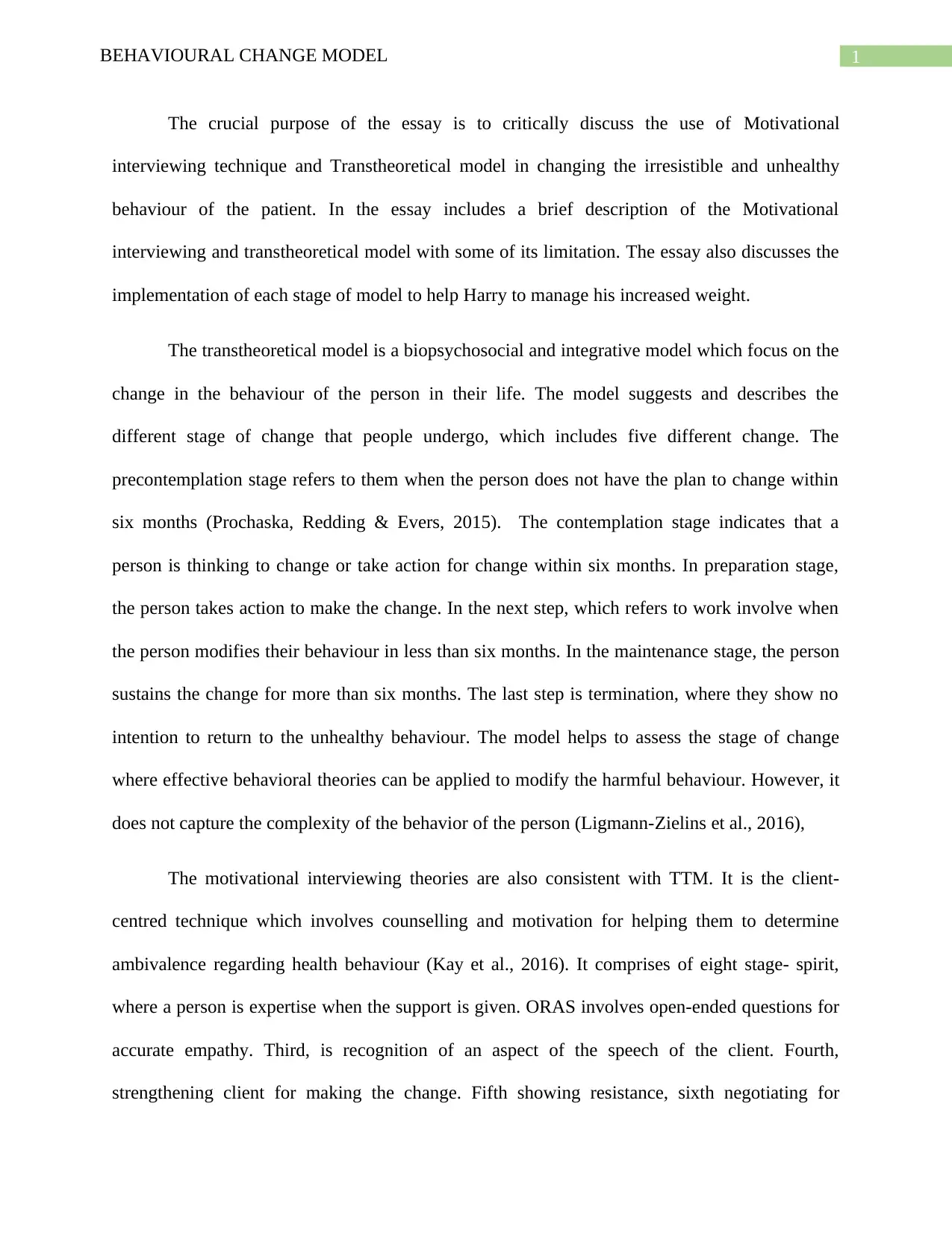
1BEHAVIOURAL CHANGE MODEL
The crucial purpose of the essay is to critically discuss the use of Motivational
interviewing technique and Transtheoretical model in changing the irresistible and unhealthy
behaviour of the patient. In the essay includes a brief description of the Motivational
interviewing and transtheoretical model with some of its limitation. The essay also discusses the
implementation of each stage of model to help Harry to manage his increased weight.
The transtheoretical model is a biopsychosocial and integrative model which focus on the
change in the behaviour of the person in their life. The model suggests and describes the
different stage of change that people undergo, which includes five different change. The
precontemplation stage refers to them when the person does not have the plan to change within
six months (Prochaska, Redding & Evers, 2015). The contemplation stage indicates that a
person is thinking to change or take action for change within six months. In preparation stage,
the person takes action to make the change. In the next step, which refers to work involve when
the person modifies their behaviour in less than six months. In the maintenance stage, the person
sustains the change for more than six months. The last step is termination, where they show no
intention to return to the unhealthy behaviour. The model helps to assess the stage of change
where effective behavioral theories can be applied to modify the harmful behaviour. However, it
does not capture the complexity of the behavior of the person (Ligmann-Zielins et al., 2016),
The motivational interviewing theories are also consistent with TTM. It is the client-
centred technique which involves counselling and motivation for helping them to determine
ambivalence regarding health behaviour (Kay et al., 2016). It comprises of eight stage- spirit,
where a person is expertise when the support is given. ORAS involves open-ended questions for
accurate empathy. Third, is recognition of an aspect of the speech of the client. Fourth,
strengthening client for making the change. Fifth showing resistance, sixth negotiating for
The crucial purpose of the essay is to critically discuss the use of Motivational
interviewing technique and Transtheoretical model in changing the irresistible and unhealthy
behaviour of the patient. In the essay includes a brief description of the Motivational
interviewing and transtheoretical model with some of its limitation. The essay also discusses the
implementation of each stage of model to help Harry to manage his increased weight.
The transtheoretical model is a biopsychosocial and integrative model which focus on the
change in the behaviour of the person in their life. The model suggests and describes the
different stage of change that people undergo, which includes five different change. The
precontemplation stage refers to them when the person does not have the plan to change within
six months (Prochaska, Redding & Evers, 2015). The contemplation stage indicates that a
person is thinking to change or take action for change within six months. In preparation stage,
the person takes action to make the change. In the next step, which refers to work involve when
the person modifies their behaviour in less than six months. In the maintenance stage, the person
sustains the change for more than six months. The last step is termination, where they show no
intention to return to the unhealthy behaviour. The model helps to assess the stage of change
where effective behavioral theories can be applied to modify the harmful behaviour. However, it
does not capture the complexity of the behavior of the person (Ligmann-Zielins et al., 2016),
The motivational interviewing theories are also consistent with TTM. It is the client-
centred technique which involves counselling and motivation for helping them to determine
ambivalence regarding health behaviour (Kay et al., 2016). It comprises of eight stage- spirit,
where a person is expertise when the support is given. ORAS involves open-ended questions for
accurate empathy. Third, is recognition of an aspect of the speech of the client. Fourth,
strengthening client for making the change. Fifth showing resistance, sixth negotiating for
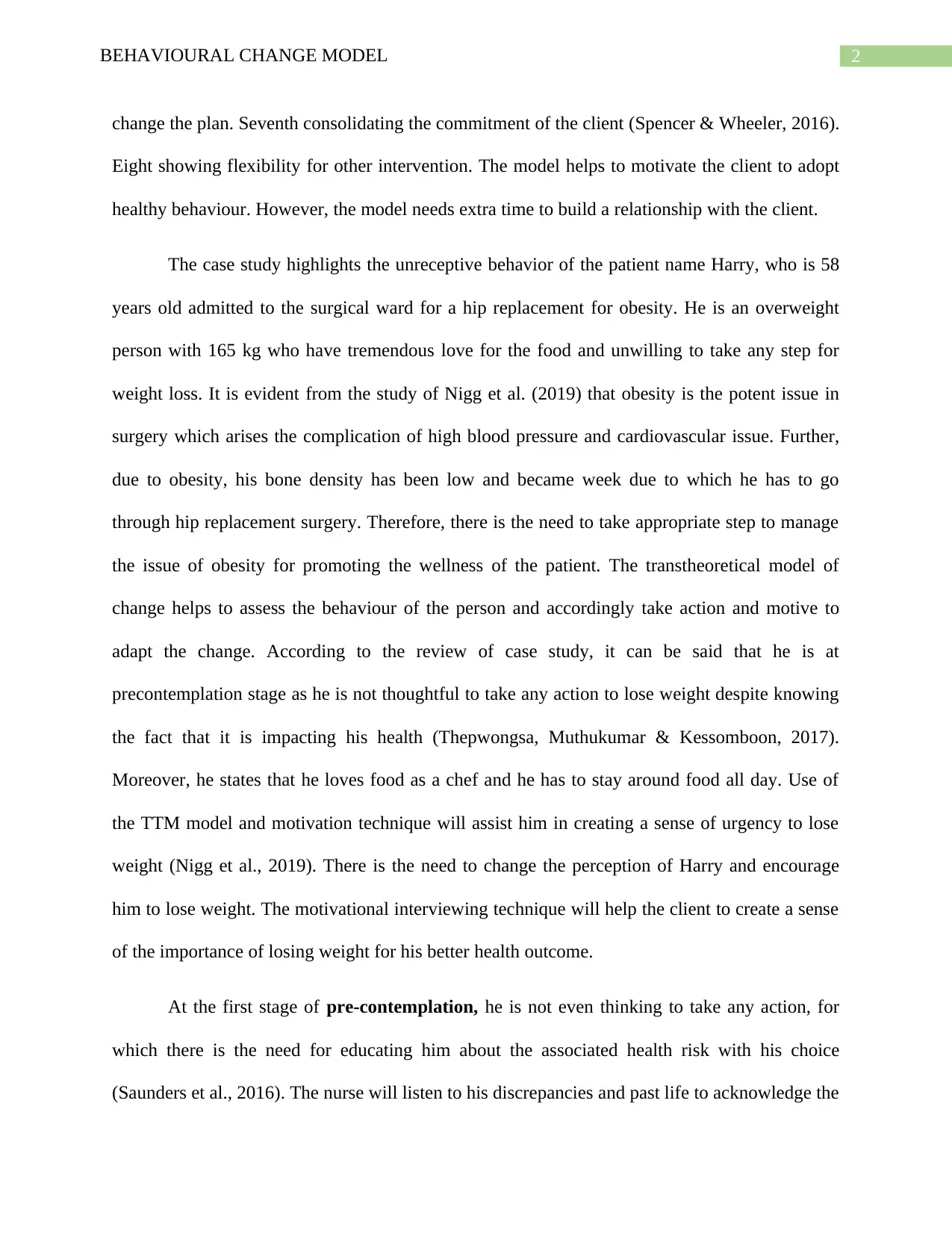
2BEHAVIOURAL CHANGE MODEL
change the plan. Seventh consolidating the commitment of the client (Spencer & Wheeler, 2016).
Eight showing flexibility for other intervention. The model helps to motivate the client to adopt
healthy behaviour. However, the model needs extra time to build a relationship with the client.
The case study highlights the unreceptive behavior of the patient name Harry, who is 58
years old admitted to the surgical ward for a hip replacement for obesity. He is an overweight
person with 165 kg who have tremendous love for the food and unwilling to take any step for
weight loss. It is evident from the study of Nigg et al. (2019) that obesity is the potent issue in
surgery which arises the complication of high blood pressure and cardiovascular issue. Further,
due to obesity, his bone density has been low and became week due to which he has to go
through hip replacement surgery. Therefore, there is the need to take appropriate step to manage
the issue of obesity for promoting the wellness of the patient. The transtheoretical model of
change helps to assess the behaviour of the person and accordingly take action and motive to
adapt the change. According to the review of case study, it can be said that he is at
precontemplation stage as he is not thoughtful to take any action to lose weight despite knowing
the fact that it is impacting his health (Thepwongsa, Muthukumar & Kessomboon, 2017).
Moreover, he states that he loves food as a chef and he has to stay around food all day. Use of
the TTM model and motivation technique will assist him in creating a sense of urgency to lose
weight (Nigg et al., 2019). There is the need to change the perception of Harry and encourage
him to lose weight. The motivational interviewing technique will help the client to create a sense
of the importance of losing weight for his better health outcome.
At the first stage of pre-contemplation, he is not even thinking to take any action, for
which there is the need for educating him about the associated health risk with his choice
(Saunders et al., 2016). The nurse will listen to his discrepancies and past life to acknowledge the
change the plan. Seventh consolidating the commitment of the client (Spencer & Wheeler, 2016).
Eight showing flexibility for other intervention. The model helps to motivate the client to adopt
healthy behaviour. However, the model needs extra time to build a relationship with the client.
The case study highlights the unreceptive behavior of the patient name Harry, who is 58
years old admitted to the surgical ward for a hip replacement for obesity. He is an overweight
person with 165 kg who have tremendous love for the food and unwilling to take any step for
weight loss. It is evident from the study of Nigg et al. (2019) that obesity is the potent issue in
surgery which arises the complication of high blood pressure and cardiovascular issue. Further,
due to obesity, his bone density has been low and became week due to which he has to go
through hip replacement surgery. Therefore, there is the need to take appropriate step to manage
the issue of obesity for promoting the wellness of the patient. The transtheoretical model of
change helps to assess the behaviour of the person and accordingly take action and motive to
adapt the change. According to the review of case study, it can be said that he is at
precontemplation stage as he is not thoughtful to take any action to lose weight despite knowing
the fact that it is impacting his health (Thepwongsa, Muthukumar & Kessomboon, 2017).
Moreover, he states that he loves food as a chef and he has to stay around food all day. Use of
the TTM model and motivation technique will assist him in creating a sense of urgency to lose
weight (Nigg et al., 2019). There is the need to change the perception of Harry and encourage
him to lose weight. The motivational interviewing technique will help the client to create a sense
of the importance of losing weight for his better health outcome.
At the first stage of pre-contemplation, he is not even thinking to take any action, for
which there is the need for educating him about the associated health risk with his choice
(Saunders et al., 2016). The nurse will listen to his discrepancies and past life to acknowledge the
⊘ This is a preview!⊘
Do you want full access?
Subscribe today to unlock all pages.

Trusted by 1+ million students worldwide
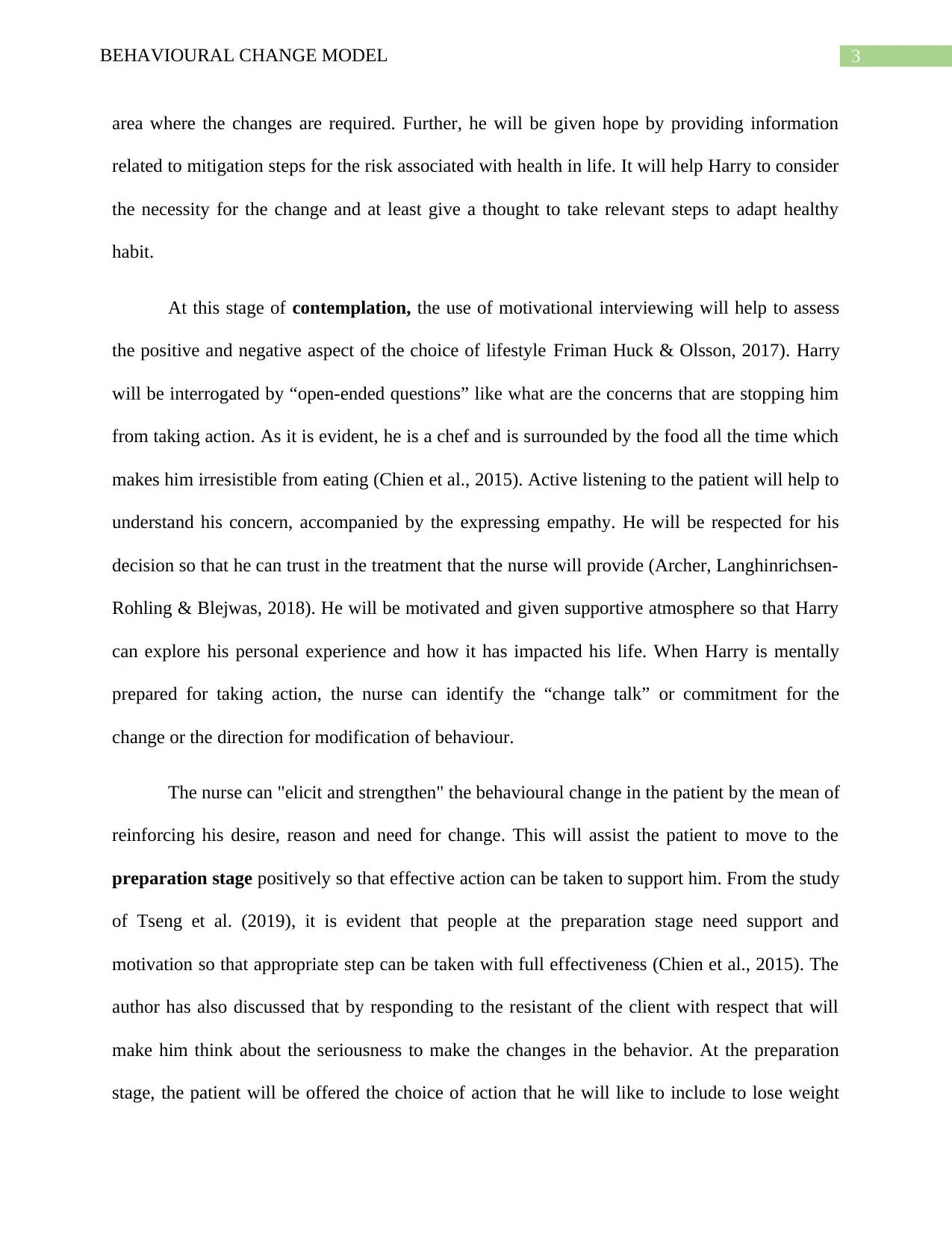
3BEHAVIOURAL CHANGE MODEL
area where the changes are required. Further, he will be given hope by providing information
related to mitigation steps for the risk associated with health in life. It will help Harry to consider
the necessity for the change and at least give a thought to take relevant steps to adapt healthy
habit.
At this stage of contemplation, the use of motivational interviewing will help to assess
the positive and negative aspect of the choice of lifestyle Friman Huck & Olsson, 2017). Harry
will be interrogated by “open-ended questions” like what are the concerns that are stopping him
from taking action. As it is evident, he is a chef and is surrounded by the food all the time which
makes him irresistible from eating (Chien et al., 2015). Active listening to the patient will help to
understand his concern, accompanied by the expressing empathy. He will be respected for his
decision so that he can trust in the treatment that the nurse will provide (Archer, Langhinrichsen-
Rohling & Blejwas, 2018). He will be motivated and given supportive atmosphere so that Harry
can explore his personal experience and how it has impacted his life. When Harry is mentally
prepared for taking action, the nurse can identify the “change talk” or commitment for the
change or the direction for modification of behaviour.
The nurse can "elicit and strengthen" the behavioural change in the patient by the mean of
reinforcing his desire, reason and need for change. This will assist the patient to move to the
preparation stage positively so that effective action can be taken to support him. From the study
of Tseng et al. (2019), it is evident that people at the preparation stage need support and
motivation so that appropriate step can be taken with full effectiveness (Chien et al., 2015). The
author has also discussed that by responding to the resistant of the client with respect that will
make him think about the seriousness to make the changes in the behavior. At the preparation
stage, the patient will be offered the choice of action that he will like to include to lose weight
area where the changes are required. Further, he will be given hope by providing information
related to mitigation steps for the risk associated with health in life. It will help Harry to consider
the necessity for the change and at least give a thought to take relevant steps to adapt healthy
habit.
At this stage of contemplation, the use of motivational interviewing will help to assess
the positive and negative aspect of the choice of lifestyle Friman Huck & Olsson, 2017). Harry
will be interrogated by “open-ended questions” like what are the concerns that are stopping him
from taking action. As it is evident, he is a chef and is surrounded by the food all the time which
makes him irresistible from eating (Chien et al., 2015). Active listening to the patient will help to
understand his concern, accompanied by the expressing empathy. He will be respected for his
decision so that he can trust in the treatment that the nurse will provide (Archer, Langhinrichsen-
Rohling & Blejwas, 2018). He will be motivated and given supportive atmosphere so that Harry
can explore his personal experience and how it has impacted his life. When Harry is mentally
prepared for taking action, the nurse can identify the “change talk” or commitment for the
change or the direction for modification of behaviour.
The nurse can "elicit and strengthen" the behavioural change in the patient by the mean of
reinforcing his desire, reason and need for change. This will assist the patient to move to the
preparation stage positively so that effective action can be taken to support him. From the study
of Tseng et al. (2019), it is evident that people at the preparation stage need support and
motivation so that appropriate step can be taken with full effectiveness (Chien et al., 2015). The
author has also discussed that by responding to the resistant of the client with respect that will
make him think about the seriousness to make the changes in the behavior. At the preparation
stage, the patient will be offered the choice of action that he will like to include to lose weight
Paraphrase This Document
Need a fresh take? Get an instant paraphrase of this document with our AI Paraphraser
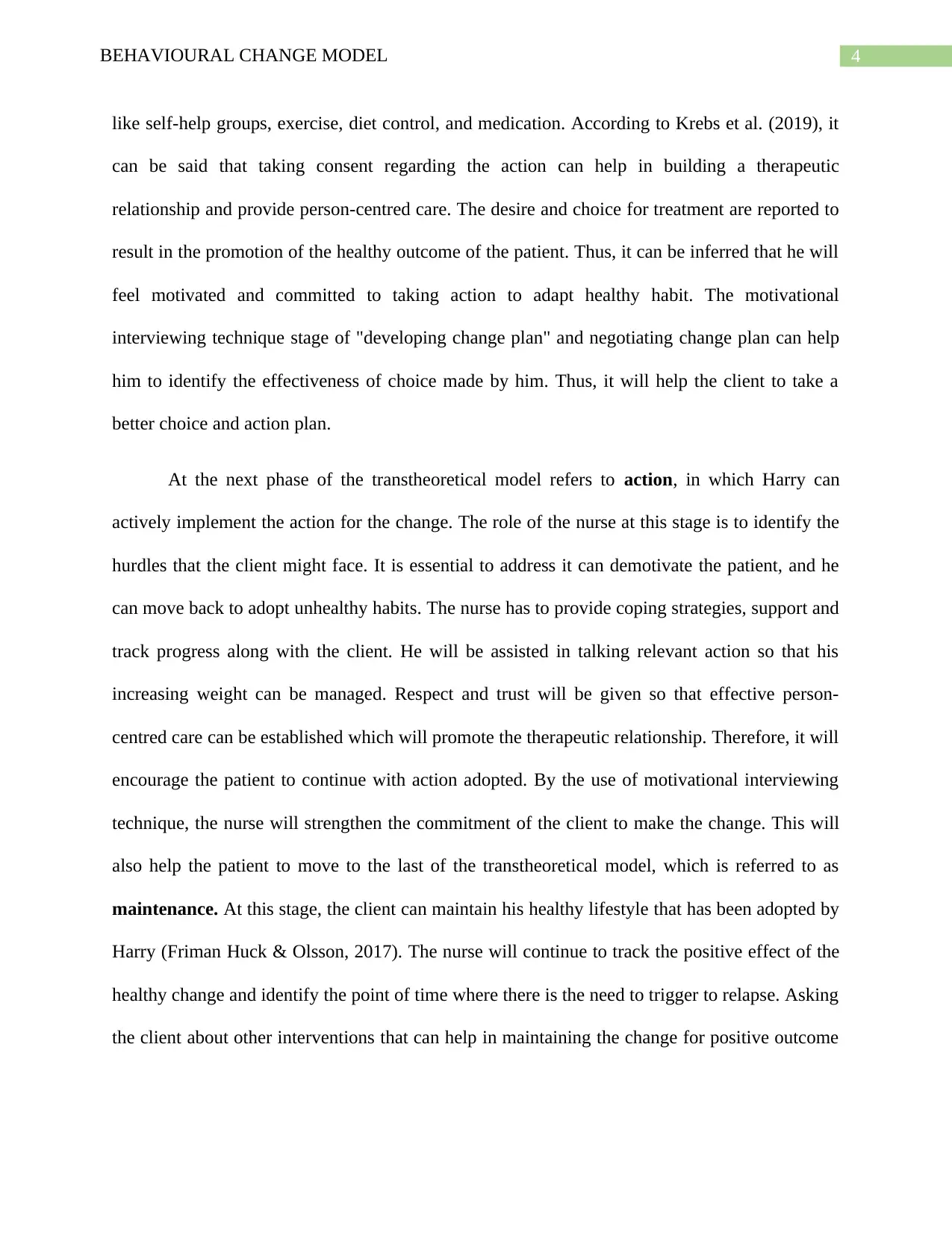
4BEHAVIOURAL CHANGE MODEL
like self-help groups, exercise, diet control, and medication. According to Krebs et al. (2019), it
can be said that taking consent regarding the action can help in building a therapeutic
relationship and provide person-centred care. The desire and choice for treatment are reported to
result in the promotion of the healthy outcome of the patient. Thus, it can be inferred that he will
feel motivated and committed to taking action to adapt healthy habit. The motivational
interviewing technique stage of "developing change plan" and negotiating change plan can help
him to identify the effectiveness of choice made by him. Thus, it will help the client to take a
better choice and action plan.
At the next phase of the transtheoretical model refers to action, in which Harry can
actively implement the action for the change. The role of the nurse at this stage is to identify the
hurdles that the client might face. It is essential to address it can demotivate the patient, and he
can move back to adopt unhealthy habits. The nurse has to provide coping strategies, support and
track progress along with the client. He will be assisted in talking relevant action so that his
increasing weight can be managed. Respect and trust will be given so that effective person-
centred care can be established which will promote the therapeutic relationship. Therefore, it will
encourage the patient to continue with action adopted. By the use of motivational interviewing
technique, the nurse will strengthen the commitment of the client to make the change. This will
also help the patient to move to the last of the transtheoretical model, which is referred to as
maintenance. At this stage, the client can maintain his healthy lifestyle that has been adopted by
Harry (Friman Huck & Olsson, 2017). The nurse will continue to track the positive effect of the
healthy change and identify the point of time where there is the need to trigger to relapse. Asking
the client about other interventions that can help in maintaining the change for positive outcome
like self-help groups, exercise, diet control, and medication. According to Krebs et al. (2019), it
can be said that taking consent regarding the action can help in building a therapeutic
relationship and provide person-centred care. The desire and choice for treatment are reported to
result in the promotion of the healthy outcome of the patient. Thus, it can be inferred that he will
feel motivated and committed to taking action to adapt healthy habit. The motivational
interviewing technique stage of "developing change plan" and negotiating change plan can help
him to identify the effectiveness of choice made by him. Thus, it will help the client to take a
better choice and action plan.
At the next phase of the transtheoretical model refers to action, in which Harry can
actively implement the action for the change. The role of the nurse at this stage is to identify the
hurdles that the client might face. It is essential to address it can demotivate the patient, and he
can move back to adopt unhealthy habits. The nurse has to provide coping strategies, support and
track progress along with the client. He will be assisted in talking relevant action so that his
increasing weight can be managed. Respect and trust will be given so that effective person-
centred care can be established which will promote the therapeutic relationship. Therefore, it will
encourage the patient to continue with action adopted. By the use of motivational interviewing
technique, the nurse will strengthen the commitment of the client to make the change. This will
also help the patient to move to the last of the transtheoretical model, which is referred to as
maintenance. At this stage, the client can maintain his healthy lifestyle that has been adopted by
Harry (Friman Huck & Olsson, 2017). The nurse will continue to track the positive effect of the
healthy change and identify the point of time where there is the need to trigger to relapse. Asking
the client about other interventions that can help in maintaining the change for positive outcome
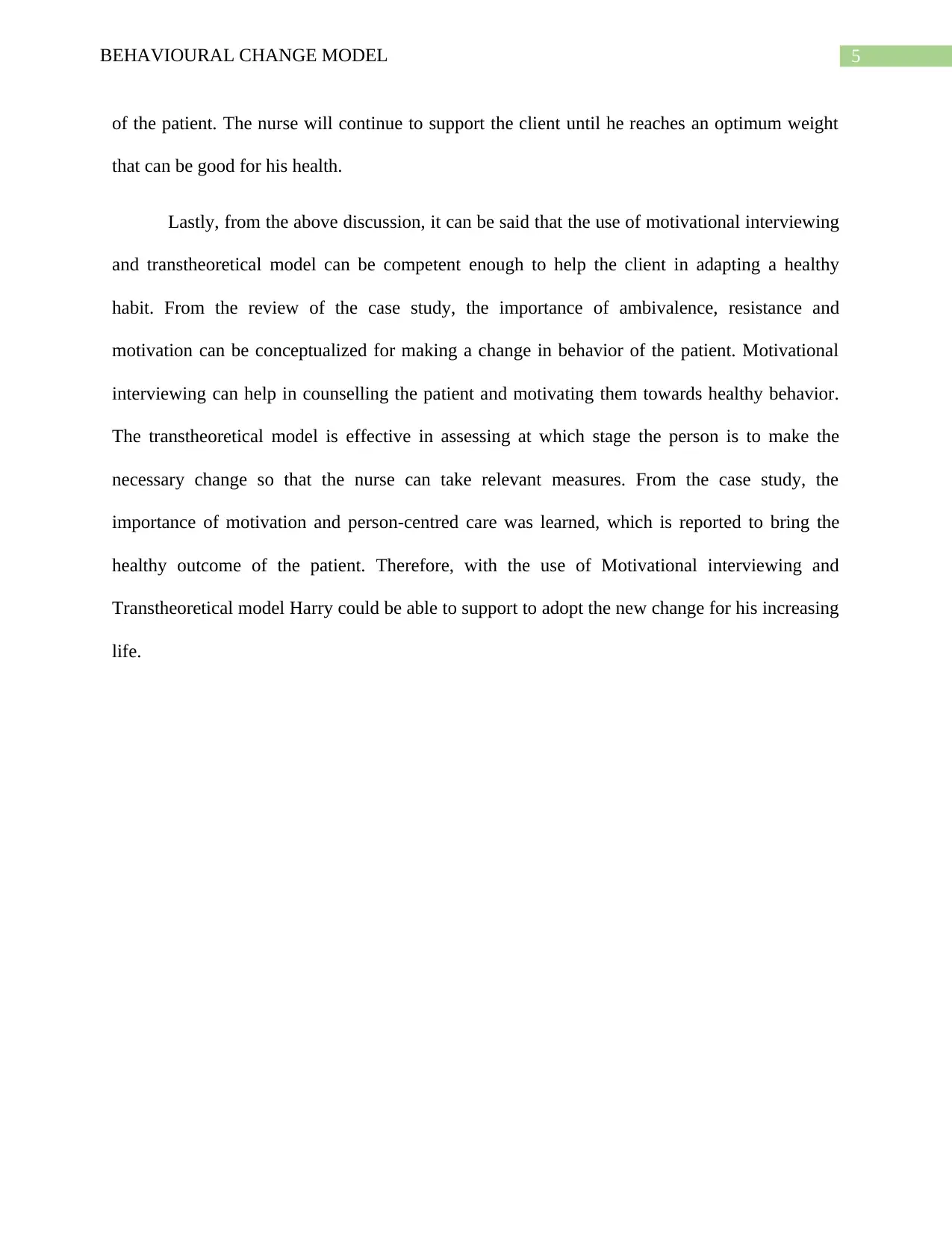
5BEHAVIOURAL CHANGE MODEL
of the patient. The nurse will continue to support the client until he reaches an optimum weight
that can be good for his health.
Lastly, from the above discussion, it can be said that the use of motivational interviewing
and transtheoretical model can be competent enough to help the client in adapting a healthy
habit. From the review of the case study, the importance of ambivalence, resistance and
motivation can be conceptualized for making a change in behavior of the patient. Motivational
interviewing can help in counselling the patient and motivating them towards healthy behavior.
The transtheoretical model is effective in assessing at which stage the person is to make the
necessary change so that the nurse can take relevant measures. From the case study, the
importance of motivation and person-centred care was learned, which is reported to bring the
healthy outcome of the patient. Therefore, with the use of Motivational interviewing and
Transtheoretical model Harry could be able to support to adopt the new change for his increasing
life.
of the patient. The nurse will continue to support the client until he reaches an optimum weight
that can be good for his health.
Lastly, from the above discussion, it can be said that the use of motivational interviewing
and transtheoretical model can be competent enough to help the client in adapting a healthy
habit. From the review of the case study, the importance of ambivalence, resistance and
motivation can be conceptualized for making a change in behavior of the patient. Motivational
interviewing can help in counselling the patient and motivating them towards healthy behavior.
The transtheoretical model is effective in assessing at which stage the person is to make the
necessary change so that the nurse can take relevant measures. From the case study, the
importance of motivation and person-centred care was learned, which is reported to bring the
healthy outcome of the patient. Therefore, with the use of Motivational interviewing and
Transtheoretical model Harry could be able to support to adopt the new change for his increasing
life.
⊘ This is a preview!⊘
Do you want full access?
Subscribe today to unlock all pages.

Trusted by 1+ million students worldwide
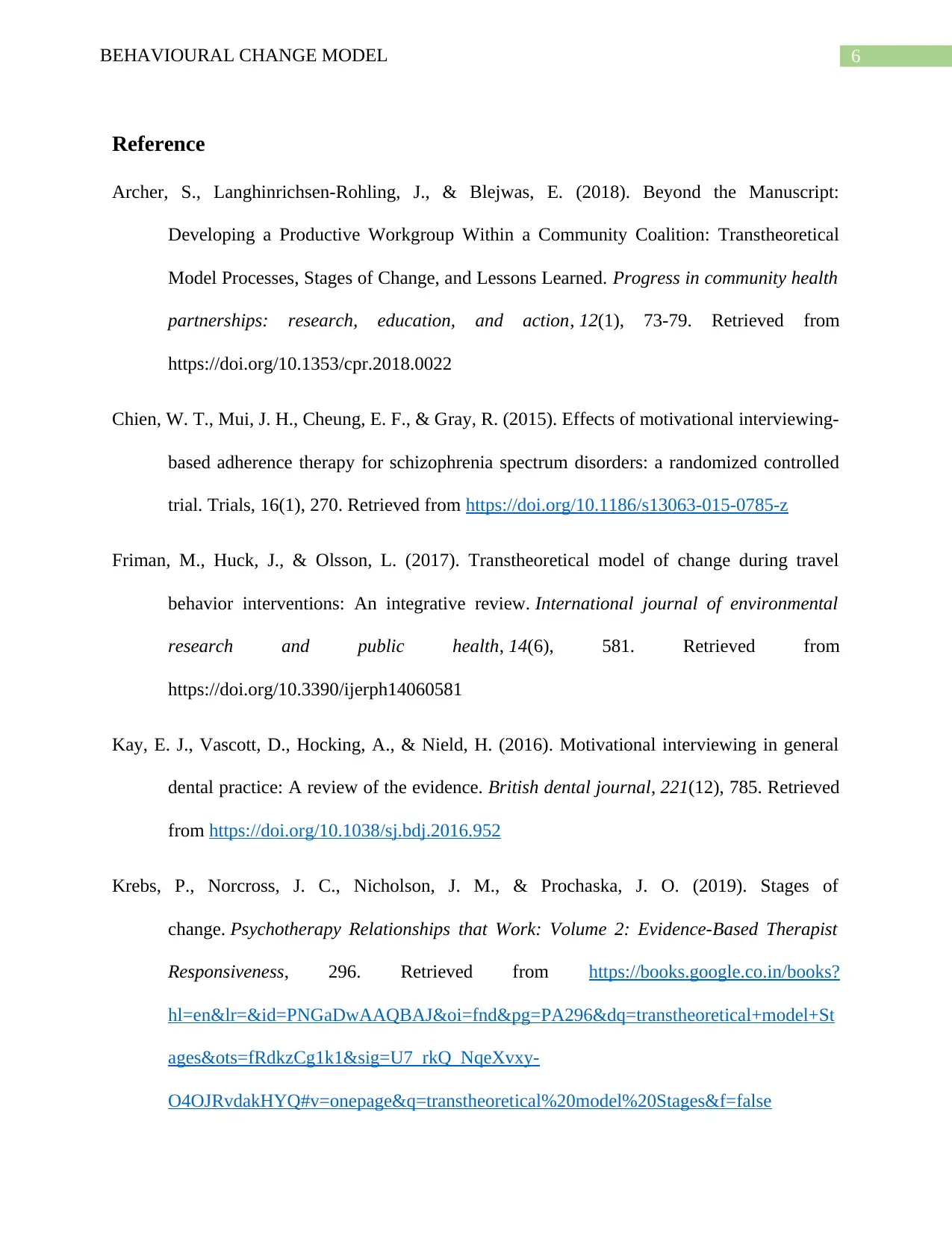
6BEHAVIOURAL CHANGE MODEL
Reference
Archer, S., Langhinrichsen-Rohling, J., & Blejwas, E. (2018). Beyond the Manuscript:
Developing a Productive Workgroup Within a Community Coalition: Transtheoretical
Model Processes, Stages of Change, and Lessons Learned. Progress in community health
partnerships: research, education, and action, 12(1), 73-79. Retrieved from
https://doi.org/10.1353/cpr.2018.0022
Chien, W. T., Mui, J. H., Cheung, E. F., & Gray, R. (2015). Effects of motivational interviewing-
based adherence therapy for schizophrenia spectrum disorders: a randomized controlled
trial. Trials, 16(1), 270. Retrieved from https://doi.org/10.1186/s13063-015-0785-z
Friman, M., Huck, J., & Olsson, L. (2017). Transtheoretical model of change during travel
behavior interventions: An integrative review. International journal of environmental
research and public health, 14(6), 581. Retrieved from
https://doi.org/10.3390/ijerph14060581
Kay, E. J., Vascott, D., Hocking, A., & Nield, H. (2016). Motivational interviewing in general
dental practice: A review of the evidence. British dental journal, 221(12), 785. Retrieved
from https://doi.org/10.1038/sj.bdj.2016.952
Krebs, P., Norcross, J. C., Nicholson, J. M., & Prochaska, J. O. (2019). Stages of
change. Psychotherapy Relationships that Work: Volume 2: Evidence-Based Therapist
Responsiveness, 296. Retrieved from https://books.google.co.in/books?
hl=en&lr=&id=PNGaDwAAQBAJ&oi=fnd&pg=PA296&dq=transtheoretical+model+St
ages&ots=fRdkzCg1k1&sig=U7_rkQ_NqeXvxy-
O4OJRvdakHYQ#v=onepage&q=transtheoretical%20model%20Stages&f=false
Reference
Archer, S., Langhinrichsen-Rohling, J., & Blejwas, E. (2018). Beyond the Manuscript:
Developing a Productive Workgroup Within a Community Coalition: Transtheoretical
Model Processes, Stages of Change, and Lessons Learned. Progress in community health
partnerships: research, education, and action, 12(1), 73-79. Retrieved from
https://doi.org/10.1353/cpr.2018.0022
Chien, W. T., Mui, J. H., Cheung, E. F., & Gray, R. (2015). Effects of motivational interviewing-
based adherence therapy for schizophrenia spectrum disorders: a randomized controlled
trial. Trials, 16(1), 270. Retrieved from https://doi.org/10.1186/s13063-015-0785-z
Friman, M., Huck, J., & Olsson, L. (2017). Transtheoretical model of change during travel
behavior interventions: An integrative review. International journal of environmental
research and public health, 14(6), 581. Retrieved from
https://doi.org/10.3390/ijerph14060581
Kay, E. J., Vascott, D., Hocking, A., & Nield, H. (2016). Motivational interviewing in general
dental practice: A review of the evidence. British dental journal, 221(12), 785. Retrieved
from https://doi.org/10.1038/sj.bdj.2016.952
Krebs, P., Norcross, J. C., Nicholson, J. M., & Prochaska, J. O. (2019). Stages of
change. Psychotherapy Relationships that Work: Volume 2: Evidence-Based Therapist
Responsiveness, 296. Retrieved from https://books.google.co.in/books?
hl=en&lr=&id=PNGaDwAAQBAJ&oi=fnd&pg=PA296&dq=transtheoretical+model+St
ages&ots=fRdkzCg1k1&sig=U7_rkQ_NqeXvxy-
O4OJRvdakHYQ#v=onepage&q=transtheoretical%20model%20Stages&f=false
Paraphrase This Document
Need a fresh take? Get an instant paraphrase of this document with our AI Paraphraser
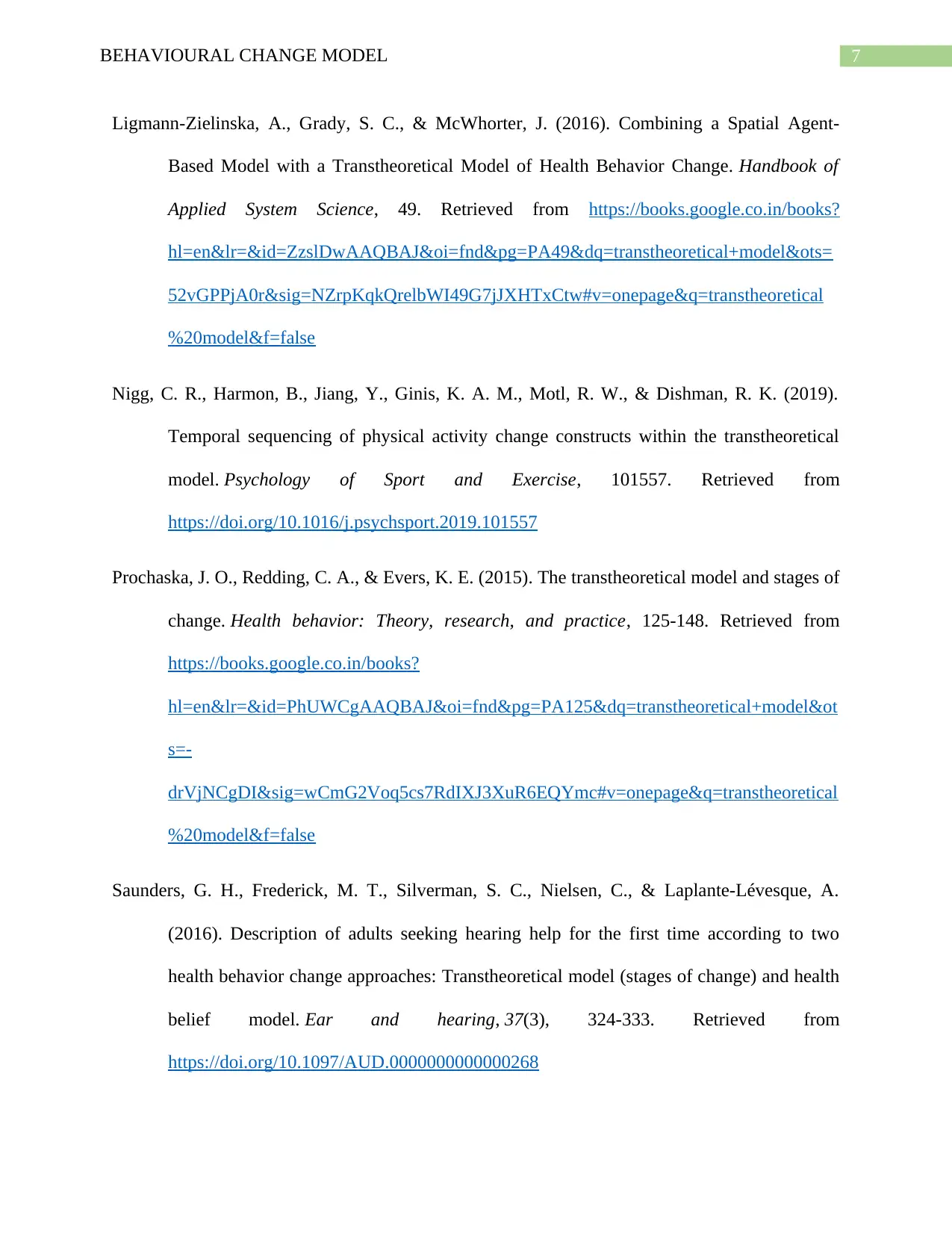
7BEHAVIOURAL CHANGE MODEL
Ligmann-Zielinska, A., Grady, S. C., & McWhorter, J. (2016). Combining a Spatial Agent-
Based Model with a Transtheoretical Model of Health Behavior Change. Handbook of
Applied System Science, 49. Retrieved from https://books.google.co.in/books?
hl=en&lr=&id=ZzslDwAAQBAJ&oi=fnd&pg=PA49&dq=transtheoretical+model&ots=
52vGPPjA0r&sig=NZrpKqkQrelbWI49G7jJXHTxCtw#v=onepage&q=transtheoretical
%20model&f=false
Nigg, C. R., Harmon, B., Jiang, Y., Ginis, K. A. M., Motl, R. W., & Dishman, R. K. (2019).
Temporal sequencing of physical activity change constructs within the transtheoretical
model. Psychology of Sport and Exercise, 101557. Retrieved from
https://doi.org/10.1016/j.psychsport.2019.101557
Prochaska, J. O., Redding, C. A., & Evers, K. E. (2015). The transtheoretical model and stages of
change. Health behavior: Theory, research, and practice, 125-148. Retrieved from
https://books.google.co.in/books?
hl=en&lr=&id=PhUWCgAAQBAJ&oi=fnd&pg=PA125&dq=transtheoretical+model&ot
s=-
drVjNCgDI&sig=wCmG2Voq5cs7RdIXJ3XuR6EQYmc#v=onepage&q=transtheoretical
%20model&f=false
Saunders, G. H., Frederick, M. T., Silverman, S. C., Nielsen, C., & Laplante-Lévesque, A.
(2016). Description of adults seeking hearing help for the first time according to two
health behavior change approaches: Transtheoretical model (stages of change) and health
belief model. Ear and hearing, 37(3), 324-333. Retrieved from
https://doi.org/10.1097/AUD.0000000000000268
Ligmann-Zielinska, A., Grady, S. C., & McWhorter, J. (2016). Combining a Spatial Agent-
Based Model with a Transtheoretical Model of Health Behavior Change. Handbook of
Applied System Science, 49. Retrieved from https://books.google.co.in/books?
hl=en&lr=&id=ZzslDwAAQBAJ&oi=fnd&pg=PA49&dq=transtheoretical+model&ots=
52vGPPjA0r&sig=NZrpKqkQrelbWI49G7jJXHTxCtw#v=onepage&q=transtheoretical
%20model&f=false
Nigg, C. R., Harmon, B., Jiang, Y., Ginis, K. A. M., Motl, R. W., & Dishman, R. K. (2019).
Temporal sequencing of physical activity change constructs within the transtheoretical
model. Psychology of Sport and Exercise, 101557. Retrieved from
https://doi.org/10.1016/j.psychsport.2019.101557
Prochaska, J. O., Redding, C. A., & Evers, K. E. (2015). The transtheoretical model and stages of
change. Health behavior: Theory, research, and practice, 125-148. Retrieved from
https://books.google.co.in/books?
hl=en&lr=&id=PhUWCgAAQBAJ&oi=fnd&pg=PA125&dq=transtheoretical+model&ot
s=-
drVjNCgDI&sig=wCmG2Voq5cs7RdIXJ3XuR6EQYmc#v=onepage&q=transtheoretical
%20model&f=false
Saunders, G. H., Frederick, M. T., Silverman, S. C., Nielsen, C., & Laplante-Lévesque, A.
(2016). Description of adults seeking hearing help for the first time according to two
health behavior change approaches: Transtheoretical model (stages of change) and health
belief model. Ear and hearing, 37(3), 324-333. Retrieved from
https://doi.org/10.1097/AUD.0000000000000268
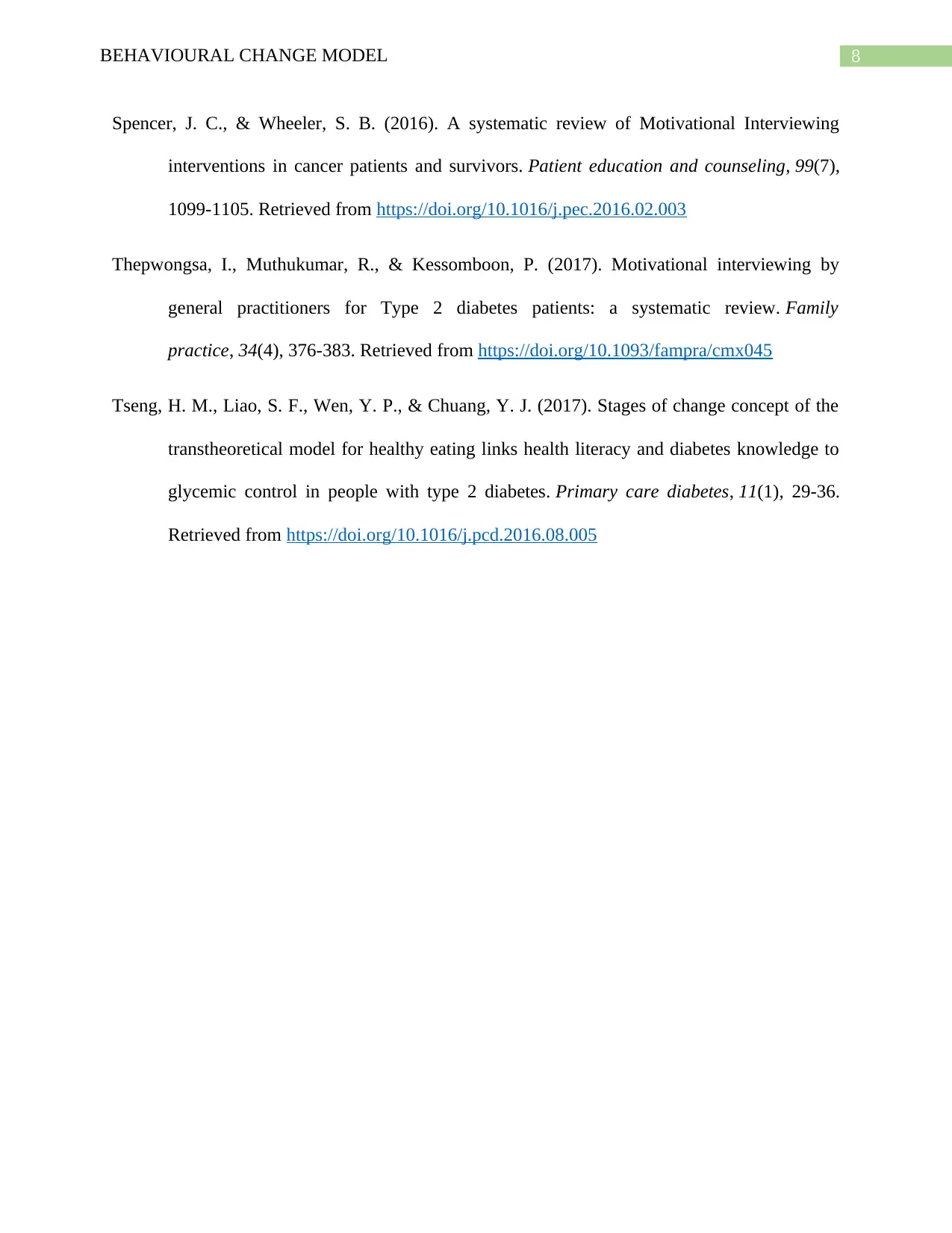
8BEHAVIOURAL CHANGE MODEL
Spencer, J. C., & Wheeler, S. B. (2016). A systematic review of Motivational Interviewing
interventions in cancer patients and survivors. Patient education and counseling, 99(7),
1099-1105. Retrieved from https://doi.org/10.1016/j.pec.2016.02.003
Thepwongsa, I., Muthukumar, R., & Kessomboon, P. (2017). Motivational interviewing by
general practitioners for Type 2 diabetes patients: a systematic review. Family
practice, 34(4), 376-383. Retrieved from https://doi.org/10.1093/fampra/cmx045
Tseng, H. M., Liao, S. F., Wen, Y. P., & Chuang, Y. J. (2017). Stages of change concept of the
transtheoretical model for healthy eating links health literacy and diabetes knowledge to
glycemic control in people with type 2 diabetes. Primary care diabetes, 11(1), 29-36.
Retrieved from https://doi.org/10.1016/j.pcd.2016.08.005
Spencer, J. C., & Wheeler, S. B. (2016). A systematic review of Motivational Interviewing
interventions in cancer patients and survivors. Patient education and counseling, 99(7),
1099-1105. Retrieved from https://doi.org/10.1016/j.pec.2016.02.003
Thepwongsa, I., Muthukumar, R., & Kessomboon, P. (2017). Motivational interviewing by
general practitioners for Type 2 diabetes patients: a systematic review. Family
practice, 34(4), 376-383. Retrieved from https://doi.org/10.1093/fampra/cmx045
Tseng, H. M., Liao, S. F., Wen, Y. P., & Chuang, Y. J. (2017). Stages of change concept of the
transtheoretical model for healthy eating links health literacy and diabetes knowledge to
glycemic control in people with type 2 diabetes. Primary care diabetes, 11(1), 29-36.
Retrieved from https://doi.org/10.1016/j.pcd.2016.08.005
⊘ This is a preview!⊘
Do you want full access?
Subscribe today to unlock all pages.

Trusted by 1+ million students worldwide
1 out of 9
Related Documents
Your All-in-One AI-Powered Toolkit for Academic Success.
+13062052269
info@desklib.com
Available 24*7 on WhatsApp / Email
![[object Object]](/_next/static/media/star-bottom.7253800d.svg)
Unlock your academic potential
Copyright © 2020–2026 A2Z Services. All Rights Reserved. Developed and managed by ZUCOL.





